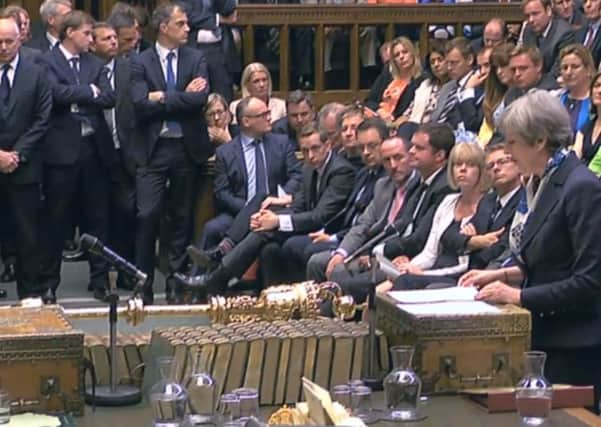Tom Richmond: The subtle arts of survival on a political knife-edge


Time will tell if she’s still in place next weekend – it depends on whether the Queen’s Speech commands sufficient support in the House of Commons.
This is a hand-to-mouth Government which will only survive if it can forge new alliances in these divisive times.
Advertisement
Hide AdAdvertisement
Hide AdYet, when Mrs May next returns to her constituency home in Sonning, she should seek the counsel of fellow villager Bernard Donoughue.
Why? The Labour peer knows all about minority governments – he was political secretary to both Harold Wilson and Jim Callaghan in the 1970s when the continuing existence of their respective premierships depended on the outcome of knife-edge Commons votes.
He tells me that his near neighbour will need to show Wilson’s subtleness, and Callaghan’s capacity to create trust.
He also thinks Mrs May needs to demonstrate three distinct sets of leadership skills – Whitehall, Westminster and national – if she’s going to be able to respond quickly, and effectively, as policy problems pile up.
Advertisement
Hide AdAdvertisement
Hide AdThis, says Lord Donoughue, is before Brexit in which he compares the intransigence of right-wing Tory ideologues to the left wing of the Labour Party in the 1970s.
His best bet – and he is, I’m pleased to report, a racing man – is that the Tories will support Mrs May until they get to calmer waters when they will, in fact, ditch her for a new leader.
The issue, says Lord Donoughue, is that there does not appear to be anyone on the horizon who could do a better job – a poor reflection on the calibre of leadership at the country’s disposal.
TALKING of leadership, Theresa May is not the first prime minister to be let down by advisors who thought they could rule the world by barking orders and marginalising anyone who disagreed.
Advertisement
Hide AdAdvertisement
Hide AdYet, given how Mrs May’s former aides Fiona Hill and Nick Timothy reportedly blocked senior civil servants and officials from meeting the PM, they clearly didn’t realise they were the problem.
Perhaps such individuals should read The Talent Lab, sports journalist Owen Slot’s book which examines how Team GB’s Olympians and Paralympians became world-beaters.
In one insight, he reveals the analysis which showed how it was the coaches – and an inability to handle pressure – that were preventing Britain’s swimmers from performing to the optimum. Once this was established and rectified, Adam Peaty and his like have not looked back.
It’s the same with 10 Downing Street. If policy aides had been subjected to similar scrutiny, I venture to suggest that the country would have been governed far more efficiently of late.
Advertisement
Hide AdAdvertisement
Hide AdI HAVE to say the Chancellor went up in my estimation when he was questioned about his low profile during the election.
Instead of obfuscating, Philip Hammond was quite candid and said the Tories didn’t talk about the economy “as much as we should have done”.
Yet, in hindsight, I do wonder whether business leaders – the wealth-creators who generate jobs and prosperity – also regret sitting the election out.
If they’d been more prominent, there might have been a chance of the post of Northern Powerhouse Minister being elevated to the Cabinet.
Advertisement
Hide AdAdvertisement
Hide AdInstead it’s been handed to the Lancastrian MP Jake Berry whose only previous high-profile role appears to have been running Boris Johnson’s disastrous Tory leadership campaign last summer.
GOOD to hear one of Philip Hammond’s more illustrious predecessors, Kenneth Clarke, in such rumbustious form the other evening. In a debate with Labour’s education spokeswoman Angela Rayner, who was promising anything and everything, Mr Clarke said the first duty of Chancellors is to ensure that “two plus two equals four”.
The problem, he said, is that Labour believe “two plus two equals five”.
TALKING of Angela Rayner, she did say in the same exchanges that ‘Brexit means Brexit’ before realising that this was also Theresa May’s mantra.
Advertisement
Hide AdAdvertisement
Hide AdGiven this newspaper’s suggestion on June 10 for a cross-party commission to lead negotiations with the EU, it makes even more sense for this process to be free of party politics – Britain’s future, after all, is at stake. It’s not just Ken Clarke, John Major and William Hague who concur. Former Lib Dem leader Nick Clegg and Labour’s ex-EU commissioner Peter Mandelson also back this approach.
IF, as Ministers say, Britain has an unrivalled reputation when it comes to distributing overseas aid, why was the expertise of the Department for International Development not used when it came to supporting all those left homeless and destitute in the immediate aftermath of the Grenfell Tower tragedy?
TRANSPORT Secretary Chris Grayling broke cover this week to say: “We’ve got to get on with the job. We were by far the largest party. Theresa May saw our vote share increase from 36 to 43 per cent.”
Despite transport featuring in the Queen’s Speech, still no response to this newspaper’s editorial early in the election calling for a definitive timetable for Mr Grayling’s plan to upgrade rail services across the Pennines. Get on with it.
Advertisement
Hide AdAdvertisement
Hide AdSOMEONE at Leeds Council clearly knows what they’re doing... when it comes to applying for gongs.
Council leader Judith Blake CBE now follows her immediate predecessors Keith Wakefield and Andrew Carter in being honoured by the Queen.
If only the authority was this proficient when it comes to transport policy.